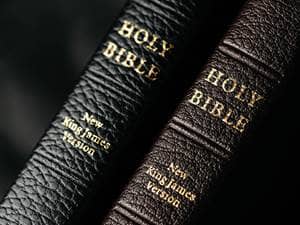
When we ask, “Who wrote the books of the Bible?” we’re not asking about who the scribes were but, instead, who the actual authors of the content of the various biblical books were. This might seem like a pretty straight-forward question, with a pretty obvious answer, but things are a little less cut and dried than we sometimes think.
Spiritual Perspective
While dozens of authors are credited with having penned the various books of the Old and New Testament, believers (from both Jewish and Christian traditions) sometimes argue that God is actually the “author” of the Bible—as the content was all inspired by Him. The Bible takes this position itself. Thus, it frequently speaks of its content as being “the word of the Lord” (e.g., Genesis 15:1; Exodus 9:20; Numbers 3:16; Deuteronomy 5:5’ Luke 22:61; Acts 8:25; 1 Thessalonians 1:8; etc.). We’re told that “all scripture” is “God-breathed” and “given by inspiration of God” (2 Timothy 3:16). Repeatedly, when the biblical prophets speak, they use the phrase “Thus saith the Lord” to introduce their revelatory messages (e.g., Exodus 4:22; Joshua 24:2; 1 Samuel 2:27; Isaiah 7:7; etc.). Consequently, from a position of faith, God is the source and author of all scripture.
Traditional Claims Versus Scholarly Understandings
From a more technical perspective, that God who inspired the content of the Bible also employed several dozen humans to receive and record His revelations to the world. Many books of the Bible list a specific person as their author. Other books, however, never specifically mention who authored them and, thus, we are left to rely upon ancient traditions about the authorship, or on hints within the text itself, in order to ascertain the authorship of a given book.
While for millennial the traditional assumptions about authorship have largely stood unchallenged, in more recent times, many scholars have begun to question the traditional attributions of certain books to certain authors. For example, Did Joshua really write the book of Joshua? Did Paul really write the epistle to the Colossians? And what of the book of Hebrews? Who wrote that? Even the book of Revelation, with its stated Johannine authorship: Which John wrote it? Believing Jews and Christians largely didn’t concern themselves with such matters during antiquity. However, as the field of biblical scholarship developed and advanced, questions such as these became common and the discussions became quite contentious, with competing “evidence” and resulting conclusions.
While many Bible believers simply accept what the text states or what tradition has handed down, modern scholars are not as quick to embrace traditional authorship of certain books, and will seek to use “scientific criteria”—like the writing style or content of a given book (including historical and cultural references, and linguistic clues—to determine authorship. Generally speaking, the school of higher biblical criticism has not successfully disclosed who the various biblical authors were. Rather, it has largely cast doubt on traditional authorship assumptions. From a scholarly perspective, this is still progress. From the perspective of believers, this may simply seem like faithlessness.
Types of Authorship
As we look who wrote each of the books of the Bible, it might be helpful to point out that determining authorship is challenging, in part because there are various ways in which a legitimate author might have conveyed his revelatory message, opening the door for questions about authorship.
Note the following examples of potential ways in which a prophet or person might be the “author” of a biblical text, and how some of those ways may cause questions to arise about who really penned this or that book of the Bible:
Genuine Authorship: A man like Paul might actually put “pen to paper” (or quill to parchment) and actually write, using his own hand, a book or letter that would eventually end up in the Bible. In this sense, he is quite literally the author of the letter or epistle, and the book attributed to him—and, in such a case, his authorship is not likely to be called into question.
Dictated Authorship: In this case, a book of scripture might rightly be attributed to an author, because the content is his. However, in dictating a letter, book, or prophesy to a scribe, that portion of the Bible may develop some stylistic elements which do not match the author’s other writings, because it was dictated but not recorded word-for-word. In a case like this, the author could still be someone like Isaiah. However, scholars might notice stylistic differences that raise red flags, causing them to question whether Isaiah could actually be the author of the text attributed to him.
Conveyance Authorship: In this case, the originator of the ideas (in a scriptural text)—the prophet, as we often say—conveyed his teachings, revelations, or ideas to another (perhaps a scribe). That secretary or assistant then used those ideas to compile the work in the name of the person whose ideas they were, but in a way that does not match the writing style of the author of the ideas. Rather, the scribe puts them in his own words as he writes them—quite different from the dictatory method mentioned above. Of course, once again, red flags would be raised about authorship in a case like this. It is worth pointing out that anciently, if the disciples (or students) of an author complied his thoughts into a work, the work was still considered as being authored by the one it was attributed to (because the ideas were originally his)—even if the text was compiled many years after the death of the person to whom the ideas belonged.
Pseudonymous Authorship: This is when someone writes under the name of a famed author, most likely in order to give their pseudonymous writings authority or credence. In this case, the text produced could not rightly be said to have been “authored” by the person it is falsely being attributed to.
Unstated but Assumed Authorship: This is a common problem with many biblical books. For example, it is widely assumed that Matthew wrote the Gospel of Matthew. That has been the tradition of the Church for nearly two thousand years. However, the Gospel of Matthew never actually states who its author is. Thus, we have made assumptions about the authorship—assumptions that may or may not be right, but which certainly are open to questions and potential revisions of belief or tradition.
Traditional Beliefs Versus Current Theories About Authorship
In the chart below is listed the various books of the Old and New Testament—including what person their authorship has traditionally been attributed to, in addition to who some scholars today think actually wrote the book in question. As one looks over the chart below, it is important to keep in mind a few things. First, there is no way (in a short article such as this) to present all the theories currently afloat regarding a given text’s authorship. Thus, I have presented some common and current theories, but I have not presented all of the various theories, nor discussed (in the chart) the reasons for or against those theories. Second, one should remember that these definitely are theories. Some have more support than others, but none of them are ultimately provable. Thus, the scholars who have proposed them may feel quite certain about the evidence, but the “evidence” is still scant enough that we cannot say with any degree of certainty if these theories are right or wrong. Finally, while I have listed various popular theories under the “Contemporary Scholarly Views” column of this chart, I have purposefully withheld my own views about authorship and the accuracy or inaccuracy of the theories I have listed. Thus, the reader should be aware that I am not giving my personal opinions, only the views of various biblical scholars.
|
Name of the Biblical Book |
Authorship Originally or Traditionally Attributed To |
Contemporary Scholarly Views and Conjecture About Authorship |
|
Genesis |
Moses |
Moses may have been the source of an ancient oral epic which included Genesis (and the rest of the Torah, or “Books of Moses”), but the five books that have traditionally been attributed to him are now believed to have been passed down through four different source traditions—the “Jahwist” (J), the “Elohist” (E), the “Deuteronomist” (D), and the “Priestly” (P). These initially oral strains were written, redacted, and merged (over time), creating the form of these five books now considered canonical by Jews and Christians. |
|
Exodus |
Moses |
See comments about Genesis above. |
|
Leviticus |
Moses |
See comments about Genesis above. |
|
Numbers |
Moses |
See comments about Genesis above. |
|
Deuteronomy |
Moses |
See comments about Genesis above and comments about Joshua below. |
|
Joshua |
Joshua |
Unknown. The book is believed to have originally been a section in a much larger work, typically called the “Deuteronomistic History,” which included Deuteronomy, Josuha, Judges, Samuel, and Kings—and which was most likely written by a single author who was drawing from a collection of sources already extant. |
|
Judges |
Unknown |
Unknown. See comments about Joshua above. |
|
Ruth |
Samuel |
Unknown |
|
1 Samuel |
Samuel with additions by Gad and Nathan |
Unknown. See comments about Joshua above. |
|
2 Samuel |
Samuel with additions by Gad and Nathan |
Unknown. See comments about Joshua above. |
|
1 Kings |
Jeremiah |
Unknown. See comments about Joshua above. |
|
2 Kings |
Jeremiah |
Unknown. See comments about Joshua above. |
|
1 Chronicles |
Ezra |
The “Chronicler,” who is believed by some (though not all) to be Ezra. |
|
2 Chronicles |
Ezra |
The “Chronicler,” who is believed by some (though not all) to be Ezra. |
|
Ezra |
Ezra |
The “Chronicler,” who is believed by some (though not all) to be Ezra. Some hold that the book of Ezra has gone through multiple stages of editing and splicing—and may be a synthesizing of multiple documents from different authors. |
|
Nehemiah |
Ezra |
This text was initially part of the book of Ezra and, thus, many believe that Nehemiah was penned by the same author as the book of Ezra. |
|
Esther |
Unknown authorship, or a redaction (by men of the “Great Synagogue”) of an original text by Mordecai |
Unknown author. Possibly a composition based off of multiple sources, redacted by either a Persian or Palestinian Jew. |
|
Job |
Unknown |
An unknown Israelite. |
|
Psalms |
73 by David 50 Unknown 12 by Asaph 11 by the sons of Korah 2 by Solomon 1 by Moses 1 by Ethan 1 co-composed by Heman & Korah |
73 by David 50 by an unknown author 12 by Asaph 11 by the sons of Korah 2 by Solomon 1 by Moses 1 by Ethan 1 co-composed by Heman & Korah |
|
Proverbs |
29 by Solomon 1 by Agur 1 by Lemuel |
29 by Solomon 1 by Agur 1 by Lemuel |
|
Ecclesiastes |
Solomon |
Unknown, but believed to not be Solomon. Some conjecture that David’s son (the “preacher”), might be the author—since his words are heavily cited within the text. |
|
Song of Solomon |
Solomon |
An unknown author most likely living long after Solomon. |
|
Isaiah |
Isaiah |
Chapters 1-39—Isaiah; Chapters 40-55—Deutero-Isaiah (probably a student or follower of the prophet); Chapters 56-66—Trito Isaiah (possibly a student of Deutero-Isaiah, but someone living in the post-exilic period). Some scholars conjecture that parts of Isaiah could have been conveyed by Isaiah to his disciples/students, thereby explaining the shift in style and vocabulary, though this is a less common belief. |
|
Jeremiah |
Jeremiah |
Jeremiah and a subsequent student, perhaps via conveyance (as mentioned above). |
|
Lamentations |
Jeremiah |
Unknown. Perhaps written by Jeremian, or by a handful of anonymous poets, and eventually combined into a singular text. |
|
Ezekiel |
Ezekiel |
Ezekial, based on a series of visions he had, but possibly combined into a single text well after the prophet’s death. |
|
Daniel |
Daniel |
Unknown, but traditionally assumed to have not been written by Daniel, as many scholars believe Daniel is a fictitious figure. |
|
Hosea |
Hosea |
Hosea |
|
Joel |
Joel |
Joel, with the possibility of being finished by a continuator. |
|
Amos |
Amos |
Amos |
|
Obadiah |
Obadiah |
Obadiah |
|
Jonah |
Jonah |
Unknown. The book does not list an author, but some scholars think that it most likely was not written by Jonah himself. |
|
Micah |
Micah |
Unknown. The book does not list an author, but some scholars think that it most likely was not written by Micah himself. |
|
Nahum |
Nahum |
Nahum |
|
Habakkuk |
Habakkuk |
Habakkuk |
|
Zephaniah |
Zephaniah |
Zephaniah |
|
Haggai |
Haggai |
Unknown. Most likely by a disciple of Haggai. |
|
Zechariah |
Zechariah |
Some scholars hold that the first half (chapters 1-8) were written by Zechariah himself, and the second half (chapters 9-14) were possibly by a disciple of Zechariah, but not by Zechariah himself. |
|
Matthew |
Matthew |
Unknown. The book does not list an author, but the author is believed to not be Matthew, and believed to have relied heavily on the writings of John Mark. Some hold that Matthew was penned by a second-generation Christian. |
|
Mark |
John Mark |
Unknown. The book does not list an author, but it is believed by some scholars that it was most likely not the John Mark mentioned in the book of Acts. |
|
Luke |
Luke |
Unknown. The book does not list an author, but it is believed that it was penned by a man named Luke, but likely not the same Luke who was missionary companion of the apostle Paul. The author of Luke is also the author of the book of Acts. |
|
John |
John |
Unknown. The book does not list an author, but many scholars today believe it was not written by an eyewitness of the events described therein and, thus, could not have been penned by John the beloved apostle of Jesus. |
|
Acts |
Luke |
See comments about Luke above. |
|
Romans |
Paul |
Paul |
|
1 Corinthians |
Paul |
Paul |
|
2 Corinthians |
Paul |
Paul with the assistance of Timothy. |
|
Galatians |
Paul |
While some have questioned the Pauline authorship of this epistle, most scholars accept that Paul is its author. |
|
Ephesians |
Paul |
Unknown, but believed to not be written by Paul. Some think Paul dictated it, and the scribe inserted non-Pauline content. Others thinks it is entirely pseudepigraphic. |
|
Philippians |
Paul |
Paul |
|
Colossians |
Paul |
Unknown, but believed by many to not be Paul. Some scholars think a follower of Paul may have penned it, or perhaps he dictated it to Timothy (or another secretary) who influenced the language and stye of the letter. |
|
1 Thessalonians |
Paul |
Paul, but possibly with some non-Pauline interpolations. |
|
2 Thessalonians |
Paul |
Some scholars hold that Paul and Timonthy wrote it, while others think that a disciple of the apostle penned it after his death. |
|
1 Timothy |
Paul |
Unknown, but believed to not be Paul. |
|
2 Timothy |
Paul |
Unknown, but believed to not be Paul. |
|
Titus |
Paul |
Unknown, but believed to not be Paul. |
|
Philemon |
Paul |
Paul |
|
Hebrews |
Paul |
Unknown, but believed to not be Paul. |
|
James |
James |
Unknown. A variety of men named James have been proposed as its author (i.e., the son of Zebedee, the son of Alphaeus, the brother of Jesus). Some think the epistle is pseudepigraphic. |
|
1 Peter |
Peter |
Unknown, but most likely not Peter. Some conjecture that it is pseudonymous or was created (by Peter) through conveyance to Silvanus. |
|
2 Peter |
Peter |
Unknown, but most likely not Peter. Some think that perhaps Peter is the author, but by conveyance of ideas to a scribe or disciple. |
|
1 John |
John |
Unknown, but believed by some scholars to have been written by someone other than the author of the Gospel of John. |
|
2 John |
John |
Unknown, but believed by some to have been written by someone other that the author of 1 John. Also believed by some to have been written by the same person who wrote the Gospel of John. |
|
3 John |
John |
Unknown, but assumed by many scholars to have been written by the author of 2 John and the Gospel of John—though the identity of that John is somewhat contested. |
|
Jude |
Jude |
Unknown, but believed to not be Jude, the brother of Jesus. Some believe a different man named Jude penned it, and some think it is pseudepigraphic. |
|
Revelation |
John |
Unknown. Scholars are divided, some thinking this book was written by the author of the Gospel of John, others by a different John, and some even arguing for John the Baptizer. While it is generally accepted that a prominent Jewish-Christian figure named John penned it, his exact identity remains a matter of debate. |
In the end, the authorship of about 2/3rds of the book of the Bible has been called into question, and our ability to say with any measure of certainty who “wrote” this or who “wrote” that is very limited. Even acknowledging that the Bible is a book that recounts God’s revelation to His prophets over millennia, nevertheless, because most of the narratives and revelations were initially retained and communicated in the form of oral traditions, by the time these texts were written, edited, and canonized, not only were the names of many of the original authors lost, but many of the words—in their “final form”—were the words of the final editors rather than the persons hundreds or thousands of years earlier, who originally told the stories.
2/7/2022 11:23:16 PM







